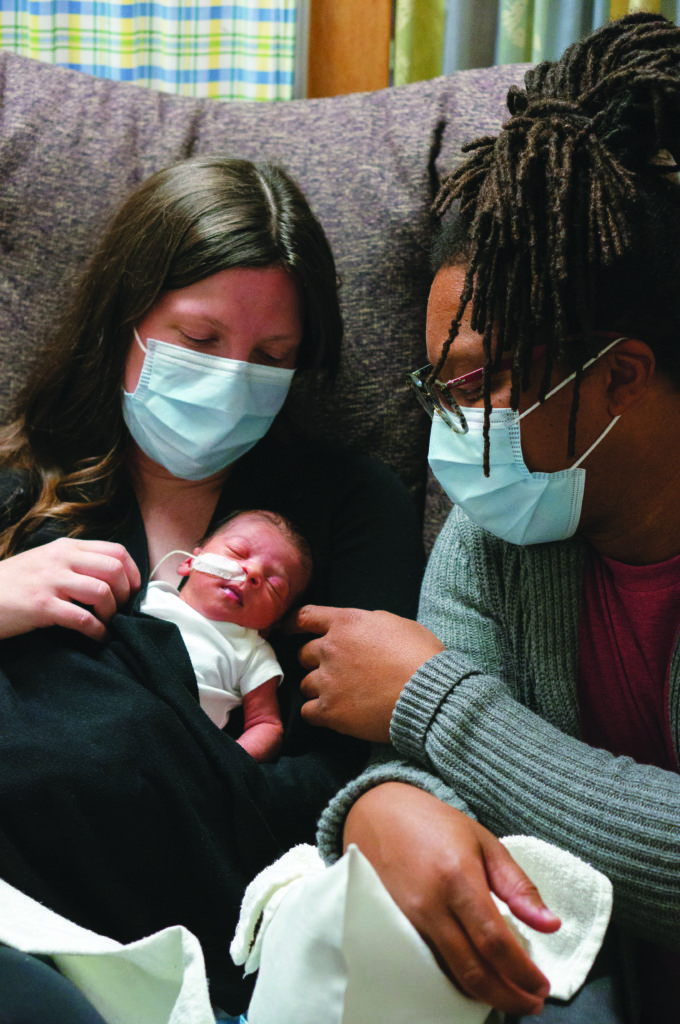
When Baby Crashes Babymoon
By Erin Wegner
When Jessica and Nathan set off on a “babymoon,” they had planned to rest and relax before their daughter arrived. A babymoon is a chance for expecting parents to get a vacation before their baby arrives. But baby had other plans.
Jessica and Nathan live in Chicago, where Nathan teaches at a small liberal arts college and Jessica is a freelance writer. As many expecting parents do, they chose to spend a few days with some friends, who own the Amber House Bed and Breakfast in Rocheport, Missouri.
Two days into their trip, Jessica work up at 2 a.m. having strong contractions that were already five minutes apart. She was only 34 weeks pregnant.
Jessica and Nathan’s birth plan had been thrown an unexpected twist. Back in Chicago, they had been meeting and working with midwives for months. Jessica going into labor in Columbia, Missouri, was not part of the plan.
They first called their midwife back in Chicago, who thought that Jessica could be having intense Braxton Hicks contractions. But after Jessica’s water broke, Nathan and Jessica drove to the nearest hospital.
Zora was born at 3:24 p.m., weighing in at 4 pounds, 6.5 ounces, 17 inches, and six weeks early. Jessica was able to get skin-to-skin contact with Zora. She says, “When she got in my arms, she just had this look like, ‘So this is what the outside is.’” Zora was named after the author Zora Neale Hurston.
Jessica says, “Zora wrote this beautiful novel, ‘Their Eyes Were Watching God.’ Reading that book was part of my curriculum at Stephens College. And my great grandmother’s name is Nora.”
Despite coming six weeks early, baby Zora didn’t need an IV or to be on oxygen, but she still had to stay in the NICU for a few weeks. “Every patient that is admitted to the NICU is placed on a continuous monitor that monitors heart rate, respiratory rate, and oxygen saturations,” says Stacie Barker, patient care supervisor. Blood pressure is also monitored frequently. Babies that are born early are at a higher risk to have episodes which can include apnea (stop breathing), bradycardia (drop in heart rate), and desaturation (decrease in oxygen saturations).
“NICU patients are also placed in a heated isolette. This keeps the baby warm to help the baby maintain normal body temperature,” Stacie says. “Premature babies can lose body heat rapidly. They don’t have the stored body fat of a full-term infant, and they can’t generate enough heat to counteract what’s lost through the surface of their bodies.”
At first, “Zora had a feeding tube placed. Breast milk was given to her through a feeding tube that was passed through her nose and into her stomach. This is called a nasogastric tube, or NG tube,” Stacie says.
When Zora was able to start nursing, this was one way Jessica and Nathan could monitor Zora’s improvements on their own. Jessica says: “We would time her when she went on breast so we could see those changes — how long she’ll actually feed there. She latches and feeds herself, but she gets too tired to finish her full feeding. But now, we’re starting to see her be more and more awake and more vocal. She’s not full-on screaming for her food. She’s done it once, but she’s close.”
“Zora was able to graduate from the NICU when she was able to maintain her body temperature without the assistance of the heated isolette, she could breast- or bottle-feed all feedings by mouth, and she had gained weight steadily,” Stacie says.
Jessica and Nathan visited with a social worker after Zora’s birth. (Every baby born at Boone Health gets visited by a social worker). The social worker was able to get Jessica a breast pump, as hers was waiting for her back in Chicago. The social worker also helped them apply to stay at the Ronald McDonald House.
Jessica says: “At first we were a little reluctant because we didn’t want to take up a spot for someone else who needs it. But it’s taken a layer of stress off of us not having to worry about the extra expense of having to have stayed in a hotel this whole time.”
Nathan says: “It’s been really wonderful. There are members of the community who come out and set up dinner every night. We’ll often leave at 6 p.m. feeding and when we get back, there will be food there, so we don’t have to worry about what we’ll have for dinner or even that added expense”.
Jessica says: “We will definitely be giving the Ronald McDonald House a lot of love after this. It’s an amazing service. It was just nice to not have to worry about another expense on top of this.”